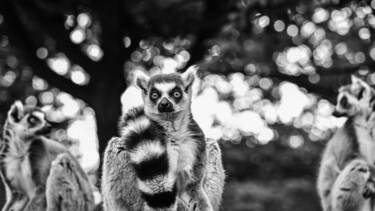Wildlife photography tips with an all-in-one lens

Is the NIKKOR Z 28-400mm f/4-8 VR the best everyday lens for wildlife photography? Nikon Creator Alfie Bowen finds out
“I really loved working with this lens,” enthuses Alfie Bowen, fine art wildlife photographer, Nikon Creator, author and activist. “Its lightweight build makes it ideal for my work as I’m always moving around, following or searching for subjects, and heavy kit just slows me down.” The new, highly compact yet super-telephoto lens he’s talking about is the NIKKOR Z 28-400mm f/4-8 VR, which he recently teamed with his Nikon Z9 to photograph troops of primates at East Anglia’s Africa Alive Reserve and Banham Zoo. Here he proves why you don’t need to go on eye-wateringly expensive safaris to get amazing wildlife shots when you have a high-performance all-in-one lens…
Tip 1: Rely on autofocus
For wildlife photography, I recommend using AF-C with 3D-tracking. I use it for 90% of my work and have found they work together in perfect synergy. The AF-C on my Z9, coupled with the quick NIKKOR Z 28-400mm f/4-8 VR, is really ideal for fast-moving subjects and suits the unpredictable nature of animals, as they can often move from one end of the frame to the other very quickly.

‘I’ll Think About It’. Z9 + NIKKOR Z 28-400mm f/4-8 VR, 300mm, 1/1250 sec, f/8, ISO 5000, ©Alfie Bowen
Alfie’s thoughts: This image (above), ‘I’ll Think About It’, very much encompasses my signature style. I like to make the subject’s eyes front and centre of my work, and I often use strong, dark backgrounds to draw that attention to the eye. I like how the lemur in the background is looking at the lemur in the foreground, who is looking off into the distance. It makes me question, what are they contemplating? What’s in the distance?
Tip 2: Use the entire focal length for flexibility
The 28-400mm wide-angle to telephoto lens responds attentively, even to the smallest changes. I really noticed this at the longer focal lengths, so, as with any new kit, I recommend spending some time experimenting with your settings. With this lens I could focus as close as 20cm at 28mm, and 1.2m at 400mm, which really allowed for detailed close-up shots without disturbing the animals, and could totally rely on the lens’ vibration reduction, which provides up to five stops of stabilisation. It worked really well with the in-body image stabilisation features, which is important in wildlife photography as often I work entirely hand-held, and even in low-light conditions or at longer focal lengths the results were sharp.

‘Hold You Tight’. Z9 + NIKKOR Z 28-400mm f/4-8 VR, 300mm, 1/1250 sec, f/8, ISO 2800, ©Alfie Bowen
Alfie’s thoughts: The ‘Hold You Tight’ image is part of a series I have been working on over the past couple of years titled Parenthood. I wanted to explore the bonds between parents and their babies in the animal kingdom, and the entire series has been inspired by the support of my mother and grandparents during my journey navigating life with autism. I like that you can see both the eyes of mum, and of her baby. I wanted to fill the frame with their incredible bond.
Tip 3: Photograph from their perspective
I think it would be a shame to look down on such beautiful creatures, so I always try to be at roughly the same level as my subject or at the same level of their eyes, as I’m trying to immerse myself in their world. This might mean having to be patient and wait around awhile, but one of the great things about this lens is that it’s so compact for an all-in-one and only weighs 725g, which is really beneficial if you want to travel light, are walking long distances or waiting a while for that perfect shot.

‘Land of the Lemurs’. Z9 + NIKKOR Z 28-400mm f/4-8 VR, 300mm,1/1250 sec, f/8 ISO 2800, ©Alfie Bowen
Alfie’s thoughts: ‘Land of the Lemurs’ is one of my favourite photographs that I’ve taken this year, so far. It’s a composition I’ve long dreamed of, in fact I actually sketched out a similar composition three years ago and have been trying to capture it ever since. When I found these three hanging out, I knew I probably had my chance if I waited long enough. The left and the right lemurs were the easy part, and the beautiful trees in the distance made for the perfect backdrop, I just had to wait a while for the central individual to move forward so as to create the distance I wanted between him and the two others. Lemurs are very sociable and inquisitive, so he was very obliging when it came to looking into the camera. He means business. After all, this is the land of lemurs.
Tip 4: Make it monochrome
Photography has become my outlet for the challenges I face living with autism. I am an emotional person, and I think that shows in my images. I want emotion to be front and centre of the image. Sometimes I feel that colour can distract from that, which is why I have always been a fan of black and white photography. I feel it goes hand in hand with my style and helps me to convey the importance I place on emotion in my work. My advice for adding emotion is to pre-plan which photographs you’ll release in black and white, but to take the photo in colour and only later convert them to black and white in post.

‘Lemur’s Lookout’. Z9 + NIKKOR Z 28-400mm f/4-8 VR, 400mm, 1/1250 sec, f/8, ISO 3600, ©Alfie Bowen
Alfie’s thoughts: “I have a deep connection with many of the species I photograph, as spending time with these animals has been a great source of solace throughout my journey with autism, and I try to show that emotion in the photographs. With this image, ‘Lemur’s Lookout’, I felt the lens was such a boon as it allowed me to really experiment when it came to compositions – from close-up portraits like this, right through to wide images like ‘Land of the Lemurs’. I feel editing them to black and white helps to invite the viewer into the world of the animals I love so much.”
More in Nature & Wildlife
Discover the NIKKOR Z 28-400mm f/4-8 VR
Inside the numbers of the new NIKKOR Z 28-400mm f/4-8 VR
Get the most out of the NIKKOR Z 28-400mm f/4-8 VR with these tips and tricks

Unlock greater creativity








